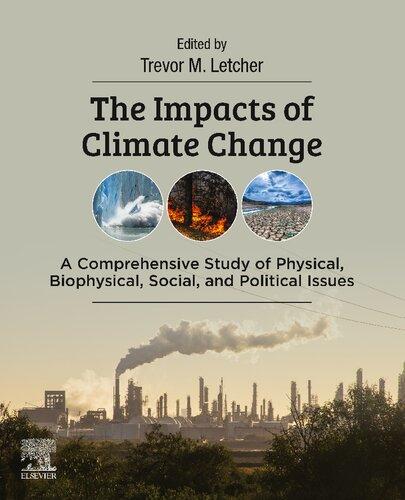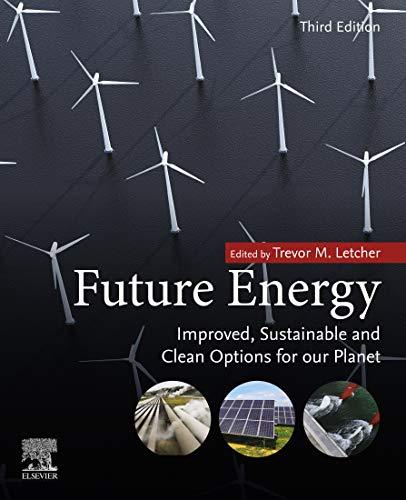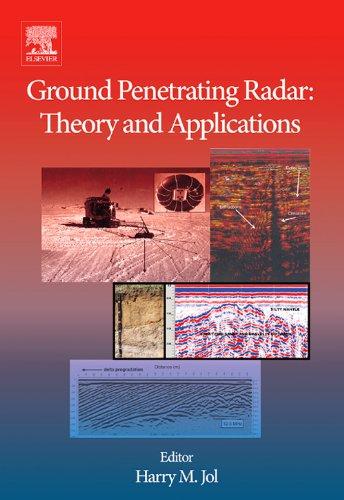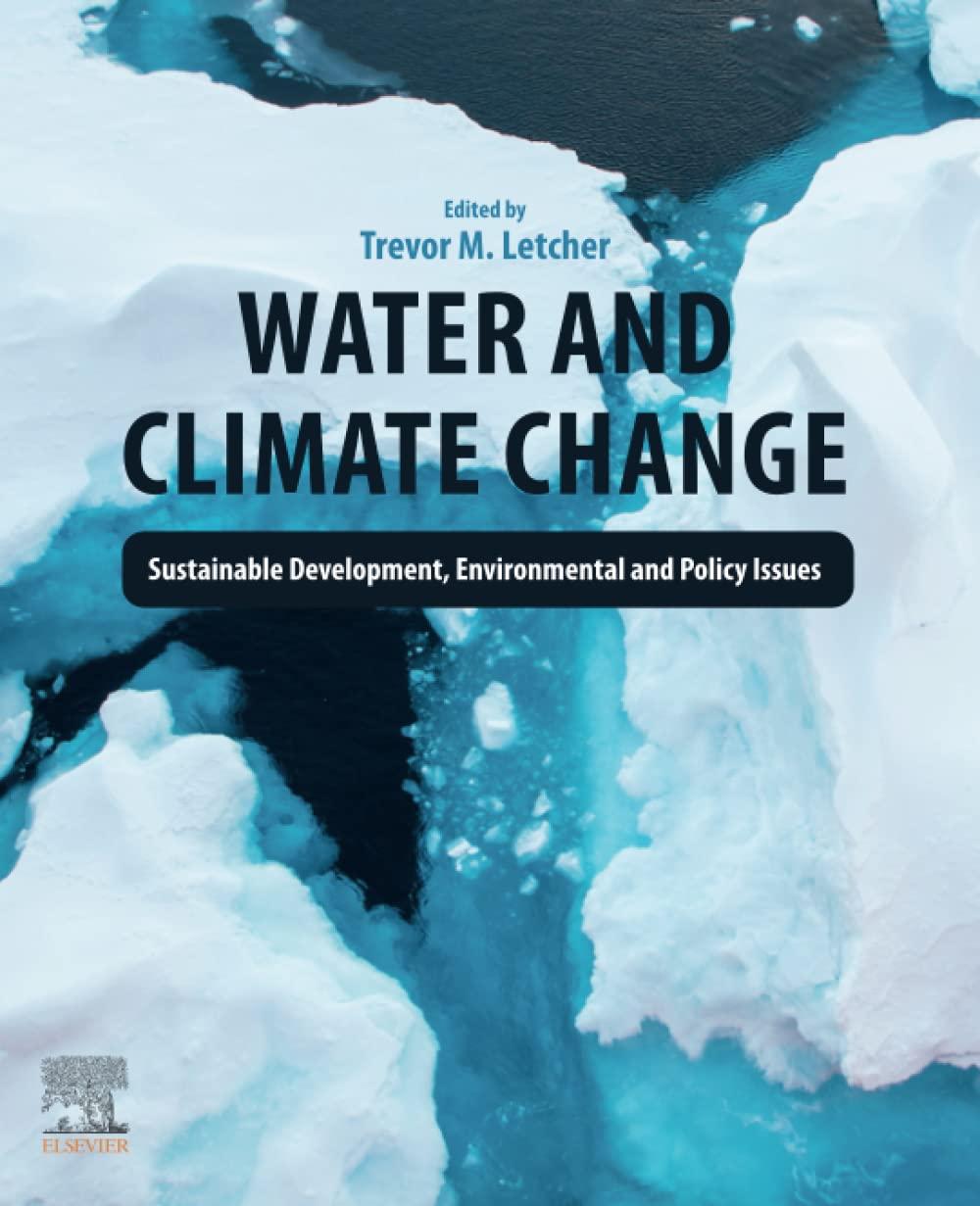https://ebookmass.com/product/water-and-climate-changesustainable-development-environmental-and-policy-issuesedited-by-trevor-m-letcher/
Instant digital products (PDF, ePub, MOBI) ready for you
Download now and discover formats that fit your needs...
Climate Change: Observed Impacts on Planet Earth 3rd Edition Trevor M. Letcher (Editor)
https://ebookmass.com/product/climate-change-observed-impacts-onplanet-earth-3rd-edition-trevor-m-letcher-editor/
ebookmass.com
The Impacts of Climate Change: A Comprehensive Study of Physical, Biophysical, Social, and Political Issues 1st Edition Trevor Letcher (Editor)
https://ebookmass.com/product/the-impacts-of-climate-change-acomprehensive-study-of-physical-biophysical-social-and-politicalissues-1st-edition-trevor-letcher-editor/ ebookmass.com
Future Energy: Improved, Sustainable and Clean Options for Our Planet 2020 Trevor M. Letcher
https://ebookmass.com/product/future-energy-improved-sustainable-andclean-options-for-our-planet-2020-trevor-m-letcher/
ebookmass.com
The Principles of Beautiful Web Design: Designing Great Sites is Not Rocket
https://ebookmass.com/product/the-principles-of-beautiful-web-designdesigning-great-sites-is-not-rocket/
ebookmass.com
Oswaal CBSE Sample Question Papers Class 10 Hindi - B Book
(For 2023 Exam) 25 September 2022 Edition Oswaal Editorial Board
https://ebookmass.com/product/oswaal-cbse-sample-question-papersclass-10-hindi-b-book-for-2023-exam-25-september-2022-edition-oswaaleditorial-board/
ebookmass.com
Hardcore Grief Recovery Steve Case
https://ebookmass.com/product/hardcore-grief-recovery-steve-case-2/
ebookmass.com
Ground Penetrating Radar Theory and Applications 1st Edition – Ebook PDF Version
https://ebookmass.com/product/ground-penetrating-radar-theory-andapplications-1st-edition-ebook-pdf-version/
ebookmass.com
Publishing Online for Writers 1st Edition Lisa Kesteven
https://ebookmass.com/product/publishing-online-for-writers-1stedition-lisa-kesteven/
ebookmass.com
Nonclinical Study Contracting and Monitoring: A Practical Guide 1st Edition
https://ebookmass.com/product/nonclinical-study-contracting-andmonitoring-a-practical-guide-1st-edition/
ebookmass.com
Managerial Economics 12th Edition https://ebookmass.com/product/managerial-economics-12th-editionchristopher-thomas/
ebookmass.com
WaterandClimateChange Editedby
TrevorM.Letcher
SchoolofChemistry,UniversityofKwaZulu-Natal, Durban,SouthAfrica
Elsevier Radarweg29,POBox211,1000AEAmsterdam,Netherlands TheBoulevard,LangfordLane,Kidlington,OxfordOX51GB,UnitedKingdom 50HampshireStreet,5thFloor,Cambridge,MA02139,UnitedStates
Copyright©2022ElsevierInc.Allrightsreserved.
Nopartofthispublicationmaybereproducedortransmittedinanyformorbyanymeans,electronicormechanical, includingphotocopying,recording,oranyinformationstorageandretrievalsystem,withoutpermissioninwritingfromthe publisher.Detailsonhowtoseekpermission,furtherinformationaboutthePublisher’spermissionspoliciesandour arrangementswithorganizationssuchastheCopyrightClearanceCenterandtheCopyrightLicensingAgency,canbefound atourwebsite: www.elsevier.com/permissions
ThisbookandtheindividualcontributionscontainedinitareprotectedundercopyrightbythePublisher(otherthanasmay benotedherein).
Notices
Knowledgeandbestpracticeinthisfieldareconstantlychanging.Asnewresearchandexperiencebroadenour understanding,changesinresearchmethods,professionalpractices,ormedicaltreatmentmaybecomenecessary.
Practitionersandresearchersmustalwaysrelyontheirownexperienceandknowledgeinevaluatingandusingany information,methods,compounds,orexperimentsdescribedherein.Inusingsuchinformationormethodstheyshouldbe mindfuloftheirownsafetyandthesafetyofothers,includingpartiesforwhomtheyhaveaprofessionalresponsibility.
Tothefullestextentofthelaw,neitherthePublishernortheauthors,contributors,oreditors,assumeanyliabilityforany injuryand/ordamagetopersonsorpropertyasamatterofproductsliability,negligenceorotherwise,orfromanyuseor operationofanymethods,products,instructions,orideascontainedinthematerialherein.
ISBN:978-0-323-99875-8
ForInformationonallElsevierpublications visitourwebsiteat https://www.elsevier.com/books-and-journals
Publisher: CandiceJanco
AcquisitionsEditor: LouisaMunro
EditorialProjectManager: MichelleFisher
ProductionProjectManager: SruthiSatheesh
CoverDesigner: MilesHitchen
TypesetbyMPSLimited,Chennai,India
1.2.1Thepolarnatureofwater
1.2.2Thehighenthalpyofvaporizationofwater
1.2.3Thehighheatcapacityofwater
1.2.4Theanomalousdensityoffrozenwater
1.2.6Acid
1.2.7Highsurfacetension,lowviscosity,andcohesiveandadhesive
2.2WaterandCO2
2.4Feedbackmechanismsandtippingpoints
2.5Whereareweinsolvingtheproblemofglobalheating?
2.6Solutions
2.7Conclusion
3.3.1Indicesofreservoirperformance
3.3.2Reservoiroperation
3.3.3ClimatechangeeffectonreservoirperformanceintheIndusBasin
3.4Conclusions
4.4Biochemodynamics
5.5Watertreatmenttomanagerisks
5.7Mixedreactors
5.8Aerobicreactors
5.9Anaerobicreactors
5.10Treatingcontaminatedgroundwater
6.3.1Sourcewaters
6.3.2Otherwatersourcesinnovativeneeds
6.3.3Urbanwatersuppliesasaresource
6.6.1Adaptationandmitigation
6.6.2Understandingthewaterbaseline
JoanneMacMahon
7.1Introduction:accesstocleanwaterindevelopingcountries
7.2Environmentalchallengestowaterpurityindevelopingcountries
7.3WHOguidelinesforwaterpurity .......................................................................120
7.3.1Microbialguidelines ...............................................................................120
7.3.2Chemicalguidelines ................................................................................121
7.3.3Radiologicalguidelines
7.3.4Acceptability:taste,odor,appearance
7.3.5Otherconsiderations
7.4Watersupplysourcesusedindevelopingcountries
7.5Watertreatmentsystemsusedindevelopingcountries
7.5.1Centralizedwatertreatmentsystems .......................................................124
7.5.2Decentralizedwatertreatmentsystems....................................................126
7.5.3WaterSafetyPlans
7.5.4Commonlyusedwatertreatmentmethods
7.5.5Waterstorage
7.6Sustainablewatermanagementsystems
8.1Introduction
8.6.1Traditionalfiltrationmethods
8.9Sustainabledisinfectionofharvestedrainwater
8.10Recentresearchonemergingmethods
8.11ImpactofCovid19pandemiconthewatersectorindevelopingcountries
8.12Comparisonofvariouspurificationtechniques
8.13Conclusions
Chapter9:Plasticpollutioninwaterwaysandintheoceans
LeiMai,HuiHeandEddyY.Zeng 9.1Introduction
9.2Globalmarineplasticpollution
9.2.1Sourcesofmarineplasticdebris..............................................................180
9.2.2Distributionofmicroplasticsinthemarineenvironment
9.3Plasticpollutioninrivers
9.3.1Distributionofplasticsinglobalrivers
9.4Riverineplasticoutflows
9.4.1Fieldmeasuredriverinemicroplasticoutflows
9.4.2Comparisonofriverineplasticoutflowsbetweenmeasurements andmodelestimates ................................................................................190
Chapter11:Groundwatersustainabilityinadigitalworld
AhmedS.Elshall,MingYeandYongshanWan
11.1Introduction
11.3Digitalgroundwater
11.4InternetofThings
11.5Web-baseddatasharing
11.6Workflowfordataprocessing
JamesF.Booker
ManzoorQadir
13.4Wastewaterasanenergysource
Chapter14:Sustainablefreshwatermanagement—theSouthAfricanapproach ....273 OghenekaroNelsonOdume
14.1Introduction
14.2Theclassificationsystemandclassificationofwaterresources
14.3Thedeterminationofthereserveandresourcequalityobjectives
14.4Reflectionsontheresourcedirectedmeasurecomponentsusingthe VaalBarragecatchmentinSouthAfricaasacasestudy
14.6Linkingresourcedirectedmeasureandsourcedirectedcontrol instrumentsforsustainablefreshwaterresourcesmanagement
Chapter15:Sustainablewatermanagementwithafocusonclimatechange
ThomasShahady
15.3.1Eutrophication
15.4.2Streamrestoration
15.4.3Greeninfrastructure
15.4.4Damremovalandwetlandcreation
15.4.5Stormwatermanagement
15.4.6Sanitation
15.4.7Sociopoliticsandeconomics
15.4.8Mitigation,protection,andecologicalservices
15.5Asustainablewaterfuture
Chapter16:Food-energy-waternexusandassessmentmodels
AnjuVijayanNairandVeeraGnaneswarGude
16.1Introduction
16.3.1WEFNexusTool2.0
16.4Comparisonofdifferentmodels
DanielA.Vallero 17.1Introduction
JuanBaztan,ScottBremer,CharlottedaCunha,AnneDeRudder,LionelJaffre`s, BethanyJorgensen,WernerKrauß,BenediktMarschu¨tz,DidierPeeters, ElisabethSchøyenJensen,Jean-PaulVanderlinden,ArjanWardekkerandZhiweiZhu
18.1Introduction
18.2Localconditionsofachangingclimate
18.2.1Bergen,Norway ..................................................................................344
18.2.2Brest,Kerourien,France .....................................................................345
18.2.3Dordrecht,theNetherlands..................................................................346
18.2.4GulfofMorbihan,France
18.2.5JadeBay,Germany
18.3Artandsciencelocalrepresentationprocessesbysiteandrelatedchallenges
18.3.1Bergen,Norway
18.3.2Brest,Kerourien,France
18.3.3Dordrecht,theNetherlands..................................................................351
18.3.4GulfofMorbihan,France
18.3.5JadeBay,Germany
18.4Metadataanddynamicmappingperspectivesforlocalrepresentations
18.5Lessonslearnedandfinalconclusions
18.5.1Conclusionsonlocalrepresentationsforcodevelopingclimate
ThomasShahady 19.4.1Waterquality
19.4.3Landmanagementpractices
Chapter20:Environmentalimpactsonglobalwaterresourcesandpoverty, withafocusonclimatechange
ClaudiaYazmı´nOrtegaMontoyaandJuanCarlosTejedaGonza´lez
20.1Environmentalimpactsonnational/regionalwaterresources
20.2Impactsofclimatechangeonpoverty
M.Mills-Novoa,R.BoelensandJ.Hoogesteger
21.1Introduction
21.7Struggle(s)forwaterandclimatejustice
21.8Conclusions
OghenekaroNelsonOdumeandChrisdeWet
22.1Introduction
22.2Keyissuesandtheneedforenvironmentalethicalconsiderationsinwater
22.3Approachestoenvironmentalethicsfromawesternperspective
22.3.1Value-orientedenvironmentalethics
Listofcontributors AdebayoJ.Adeloye Heriot-WattUniversity,Edinburgh,UnitedKingdom
JuanBaztan UniversityofVersaillesSaint-Quentin-en-Yvelines,UPS-CEARC,Guyancourt, France
R.Boelens WaterResourcesManagementGroup,DepartmentofEnvironmentalSciences, WageningenUniversity,Wageningen,TheNetherlands;CentreforLatinAmericanResearchand Documentation(CEDLA),UniversityofAmsterdam,Amsterdam,TheNetherlands;Facultyof Agronomy,CentralUniversityofEcuador,Quito,Ecuador
JamesF.Booker SienaCollege,Loudonville,NY,UnitedStates
ScottBremer CentrefortheStudyoftheSciencesandtheHumanities,UniversityofBergen, BergenNorway
CharlottedaCunha UniversityofVersaillesSaint-Quentin-en-Yvelines,UPS-CEARC, Guyancourt,France
QuanDau SchoolofClimateChangeandAdaptation,UniversityofPrinceEdwardIsland, Charlottetown,PrinceEdwardIsland,Canada
AnneDeRudder InstitutRoyald’Ae ´ ronomieSpatialedeBelgique,Bruxelles,Belgium
ChrisdeWet UnileverCentreforEnvironmentalWaterQuality,InstituteforWaterResearch, RhodesUniversity,Makhanda,SouthAfrica
AhmedS.Elshall DepartmentofEarth,Ocean,andAtmosphericScience,FloridaState University,Tallahassee,FL,UnitedStates
VeeraGnaneswarGude RichardARulaSchoolofCivilandEnvironmentalEngineering, MississippiStateUniversity,Starkville,MS,UnitedStates
HuiHe GuangdongKeyLaboratoryofEnvironmentalPollutionandHealth,CenterforEnvironmental MicroplasticsStudies,SchoolofEnvironment,JinanUniversity,Guangzhou,P.R.China
J.Hoogesteger WaterResourcesManagementGroup,DepartmentofEnvironmentalSciences, WageningenUniversity,Wageningen,TheNetherlands
LionelJaffre ` s TheatreduGrain,Brest,France
ElisabethSchøyenJensen CentrefortheStudyoftheSciencesandtheHumanities,Universityof Bergen,BergenNorway
BethanyJorgensen CivicEcologyLab,CornellUniversity,Ithaca,NY,UnitedStates
WernerKrauß UniversityofBremen,Bremen,Germany
JyotiKishenKumar FormerlyInstituteofChemicalTechnology,Matunga,Mumbai,India
TrevorM.Letcher SchoolofChemistry,UniversityofKwaZulu-Natal,Durban,SouthAfrica
JoanneMacMahon TrinityCollegeDublin,Dublin,Ireland
LeiMai GuangdongKeyLaboratoryofEnvironmentalPollutionandHealth,Centerfor EnvironmentalMicroplasticsStudies,SchoolofEnvironment,JinanUniversity,Guangzhou,P.R.China
BenediktMarschu ¨ tz KlimaundEnergiefonds,Vienna,Austria
M.Mills-Novoa DepartmentofEnvironmentalScience,PolicyandManagement,Universityof California:Berkeley,Berkeley,CA,UnitedStates;EnergyandResourcesGroup,Universityof California:Berkeley,Berkeley,CA,UnitedStates
AnjuVijayanNair RichardARulaSchoolofCivilandEnvironmentalEngineering,Mississippi StateUniversity,Starkville,MS,UnitedStates
OghenekaroNelsonOdume UnileverCentreforEnvironmentalWaterQuality,InstituteforWater Research,RhodesUniversity,Makhanda,SouthAfrica
ClaudiaYazmı´nOrtegaMontoya EscueladeHumanidadesyEducacio ´ n,Tecnologicode Monterrey,Torreo ´ n,Mexico
AniruddhaB.Pandit InstituteofChemicalTechnology,Matunga,Mumbai,India
DidierPeeters Universite ´ LibredeBruxelles,Bruxelles,Belgium
ManzoorQadir UnitedNationsUniversityInstitut eforWater,EnvironmentandHealth (UNU-INWEH),Hamilton,ON,Canada
RabeeRustum Heriot-WattUniversity,DubaiCampus,DubaiKnowledgePark,Dubai
ThomasShahady UniversityofLynchburg,Lynchburg,VA,UnitedStates
JuanCarlosTejedaGonza ´ lez FacultaddeIngenierı´aCivil,UniversidaddeColima,Colima, Mexico
JosephineTreacy TechnologicalUniversityoftheShannonMidlandsMidwest,TUS,Limerick City,Ireland
DanielA.Vallero PrattSchoolofEngineering,DukeUniversity,Durham,NC,UnitedStates
Jean-PaulVanderlinden UniversityofVersaillesSaint-Quentin-en-Yvelines,UPS-CEARC, Guyancourt,France
YongshanWan CenterforEnvironmentalMeasurementandModeling,UnitedStates EnvironmentalProtectionAgency,GulfBreeze,FL,UnitedStates
ArjanWardekker CentrefortheStudyoftheSciencesandtheHumanities,UniversityofBergen, BergenNorway
MingYe DepartmentofEarth,Ocean,andAtmosphericScience,FloridaStateUniversity, Tallahassee,FL,UnitedStates;DepartmentofScientificComputing,FloridaStateUniversity, Tallahassee,FL,UnitedStates
EddyY.Zeng GuangdongKeyLaboratoryofEnvironmentalPollutionandHealth,Centerfor EnvironmentalMicroplasticsStudies,SchoolofEnvironment,JinanUniversity,Guangzhou,P.R.China
ZhiweiZhu UniversityofVersaillesSaint-Quentin-en-Yvelines,UPS-CEARC,Guyancourt, France
Preface ThemostessentialsubstancetolifeonEarthiswater.Yet,inmanypartsoftheworld peoplearestrugglingtoaccessthequantityandqualityofwaterneededforgrowingfood, cooking,washing,andevendrinking.Inspiteoftheamazingprogressthathasbeenmade overthepastfewdecadesinmakingdrinkingwateraccessibletomillionsofpeoplein developingcountries,globally,billionsofpeoplestilllackcleanwater,thuslockingthemin povertyforgenerations(https://www.unicef.org/press-releases/billions-people-will-lackaccess-safe-water-sanitation-and-hygiene-2030-unless).Theimportanceofaddressingthe globalwatercrisishasbeenrecognizedbytheUnitedNationsbynamingMarch22as WorldWaterDay(https://www.un.org/en/observances/water-day).
Writingandeditingbooksonglobalwarming(Letcher,2019,2021a,2021b)andalsoon waste(Letcher,2020;LetcherandVallero,2019)hashighlightedtheproblemsofwater availabilityduetoourchangingclimateandalsoofwaterpollutionduetohumanactivity. Thishaspromptedmydesiretocompilethisbook,WaterandClimateChange.
Thebookcontains22chaptersandisdividedintothreesections:
•Introduction
•SustainableDevelopmentandEnvironmentalIssues
•PolicyIssues
Globalwarmingandclimatechangeareuponus,andwaterresourcesarebeing compromised.Anunderstandingofalltheparametersinvolvedinclimatechangeisgoing tobenecessaryifwearetoprotectourselvesfromfutureextremes.Waterwillplayamajor roleinhowweadapttothesechanges.
Waterqualityisparamountandaconservativeestimatelinkswaterpollutionto1.8million deathsperyear—manyofthemchildren(Mayor,2017).Waterisincrisisonanumberof fronts:
•Globalwarmingischangingthewayrainfallsordoesnotfall,bringingfloodingand droughts;
•Groundwaterisbeingdepletedasaresultofpopulationneedsandcreatingan unsustainablesituation;
•Withglobalpopulationincreasingandmoreandmorepeopledemandingwater,water availabilityisdecreasing,resultinginwatersecurityandpoliticalissueswhichhaveand willcertainlyleadtowater-wars.Anotherunsustainablesituationindevelopment;
•Waterinfrastructureisindisrepairworldwideandtreatmentplantsarebeing compromised;
•Naturalinfrastructureisbeingignored-buildingonfloodplains,deforestation, overgrazing,allresultinginanunsustainablesituation;
•Waterisbeingwasted—itischeapertousecleanfreshwaterthantousetreatedwater; and
•Thequalityofwaterisbecomingpoorerduetotherunofffromfarmsresultingina build-upofconcentrationsofhormones,nitrates,andammoniainrivers.
Theaudiencewehopetoreachwiththisnewvolumeare:policymakersinlocaland centralgovernments;students,teachers,researchers,professors,scientists,engineers,and managersworkinginfieldsrelatedtoclimatechangeandwater;editorsandnewspaper reportersresponsibleforinformingthepublic;andthegeneralpublicwhoneedtobeaware oftheimpendingdisastersthatawarmerEarthwillbring.Anintroductionisprovidedat thebeginningofeachchapterforthoseinterestedinabriefsynopsis,andcopious referencesareprovidedforthosewishingtostudyeachchaptertopicingreaterdetail.
ManyoftheauthorswerenotinvolvedinrecentassessmentsoftheIPCC,andherethey presentfreshevaluationsoftheevidencetestifyingtoaproblemthatwasdescribedaslong agoasin2008bySirDavidKingasthemostseverecalamityourcivilizationisyettoface (David,2008).
IPCCassessmentshaveproducedtwobasicconclusions:first,currentclimatechangesare unequivocal,andsecond,thisislargelyduetotheemissionofgreenhousegasesresulting fromhumanactivity.Thisbookreinforcesthesetwoconclusions.
TheInternationalSystemofQuantities(SIunits)hasbeenusedthroughoutthebook,and wherenecessary,otherunitsaregiveninparentheses.Furthermore,theauthorshave rigorouslyadheredtotheIUPACnotationandspellingofphysicalquantities.
Thisbookhasanadvantagethateachchapterhasbeenwrittenbyworld-classexperts workingintheirrespectivefields.Asaresult,thisvolumepresentsabalancedpicture acrossthewholespectrumofclimatechange.Furthermore,theauthorsarefromboththe developinganddevelopedcountriesthusgivingaworldwideperspectiveoflooming climaticproblems.The12countriesrepresentedareCanada,China,CostaRica,France, Ireland,India,Mexico,TheNetherlands,SouthAfrica,Sweden,theUnitedKingdom,and theUnitedStatesofAmerica.
Thesuccessofthebookultimatelyrestswiththe39authorsandcoauthors.Asaneditor,I wouldliketothankallofthemfortheircooperationandtheirhighlyvalued,willing,and
enthusiasticcontributions.IwouldalsoliketothankVictoriaHumeforherhelp,andalso mywife,Valerie,forherpatienceandhelpwhileIwroteandeditedthisvolume.Finally, mythanksareduetoLouisaMunroeofElsevierwhoseexpertisesteeredthisbooktoits publication.
TrevorM.Letcher SchoolofChemistry,UniversityofKwaZulu-Natal, Durban,SouthAfrica
References David,K.S.(2008).InT.M.Letcher(Ed.), Forewordto FutureEnergy:Improved,SustainableandClean OptionsforourPlanet(1stEdition).Oxford:Elsevier,ISBN:978-0-08 054808-1.
Letcher,T.M.(Ed.),(2021a). ClimateChange:ObservedImpactsonPlanetEarth (3rdEdition).NewYork, USA:Elsevier,ISBN:978-0-12 821575-3.
Letcher,T.M.(Ed.),(2021b). ImpactsofClimateChange:aComprehensiveStudyofPhysical,Societaland PoliticalIssues.Cambridge,MA:Elsevier,ISBN:978-0-12-822373-4.
Letcher,T.M.(Ed.),(2019). ManagingGlobalWarming:anInterfaceofTechnicalandHumanIssues. Cambridge,MA:Elsevier,ISBN:978-0-12-814104-5.
Letcher,T.M.,&Vallero,D.A.(Eds.),(2019). Waste:AHandbookforManagement (2ndedition).NewYork, NY:Elsevier,ISBN:9780128150603.
Letcher,T.M.(Ed.),(2020). PlasticWasteandRecycling.Oxford:Elsevier,ISBN:9780128178805.
Mayor,S.(2017).ResearchNews:Pollutionislinkedtooneinsixdeathsworldwide,studyestimates. British MedicalJournal, 357,4844.Availablefrom https://doi.org/10.1136/bmj.j4844.(Published20October 2017).
Introduction:water,thevitalchemical TrevorM.Letcher
SchoolofChemistry,UniversityofKwaZulu-Natal,Durban,SouthAfrica
ChapterOutline
1.1Introduction3
1.2Theuniquechemicalpropertiesofwater4
1.2.1Thepolarnatureofwater4
1.2.2Thehighenthalpyofvaporizationofwater4
1.2.3Thehighheatcapacityofwater5
1.2.4Theanomalousdensityoffrozenwater5
1.2.5Water,the“universal”solvent6
1.2.6Acid baseproperty7
1.2.7Highsurfacetension,lowviscosity,andcohesiveandadhesiveproperties7
1.3Waterandclimatechange8
1.4TheoriginofwateronEarth9
1.4.1Thewatercycle9
1.5Thescarcityofwater10
1.6Conclusions10 References10
1.1Introduction
ThisbookfocusesontheimportanceofwatertolifeonEarth,theimportantrolewater playsinheatingourplanetandinourchangingclimate,andontheimpactofclimate changeonwaterresources.Wewilllookatthepropertiesofwaterandseewhyitissucha vitalchemicalforplant,animal,andhumanexistence.LifeonEarthevolvedinandaround waterandasaresult,lifeinallitsformsistotallydependentonwater.
Watermakesup60% 75%,bymass,ofthehumanbody.Fromahumanpointofview,a lossofabout4%ofbodywaterleadstoseveresymptomsofdehydration,andalossof15% canresultindeath(https://rehydrate.org/dehydration/).Humanscansurviveamonth withoutfoodbutwoulddieafter3dayswithoutwater.Thisdependencereflectstheorigins oflifeonEarthinawaterenvironment3.7billionyearsagowiththeevolutionof
microscopicmicrobes(https://naturalhistory.si.edu/education/teaching-resources/life-science/ early-life-earth-animal-origins).Thisisalso0.8billionyearsaftertheformationofplanet Earthandalmost10billionyearsafterthebigbangandtheformationoftheUniverse.Itis theuniquepropertiesofwaterthathasmadelifeofEarthpossible.Andindeed,waterhas rightlybeencalledthe“moleculethatmadeus.”
1.2Theuniquechemicalpropertiesofwater Theuniquepropertiesofwaterincludeitspolarity,ahighenthalpyofvaporization,ahigh heatcapacity,ananomalousdensityofsolid,“universal”solvatingproperties,buffering property,lowviscosity,highsurfacetension,andcohesiveandadhesiveproperties.
1.2.1Thepolarnatureofwater TheO Hbondsthatmakeupthewatermolecule,involveanunequalsharingof electronsbetweentheoxygenatomandthehydrogenatom.Thisisduetotheoxygen atombeingmoreelectronegativethanthehydrogenatom,andthebondingelectronsare attractedmoretotheoxygenatom.Thisresu ltsinanasymmetricalmoleculewithan angleof104degreesbetweentheH O H,withthehydrogenendsoftheH2 Omolecule beingslightlymorepositivethantheoxygenend.Thewatermoleculebehaveslikea magnet,butinthiscase,oneendispositiveandtheothernegative.Thispolarityallows forelectrostaticattractions,calledhydro genbonding,betweenthewatermoleculesand otherpolarmolecules,anditisthishydrogenbondingthatisresponsibleformanyofthe uniquepropertiesofwater.
1.2.2Thehighenthalpyofvaporizationofwater Theprocessofevaporation,thatis,aliquidchangingintoagasorvapor,requiresenergy andthisenergyisknownastheenthalpyofvaporization, ΔHvap.Waterhasananomalously high ΔHvap,asaresultofhydrogenbondingbetweenthewatermolecules,implyingthat energyhastobeexpendedtobreakthesebondsinordertovaporizewater.
Attheboilingpointofwater,theenthalpyofvaporizationcanbeexpressedas:
implyingthat40.66kJmustbeaddedtoonemoleofwater(18.02g)tovaporizeitat373K. Lookingatthisprocessinanotherway,whenwaterevaporatessuchaswhenabreezeor windblowsoverthewater,someofthewaterevaporatesandheatmustbesupplied,sothe surroundingscooldown.Thisisknownasevaporativecooling.
Introduction:water,thevitalchemical5
Inthereverseprocessofcondensationinwhichavapororgascondensestoaliquid,energy isreleased.Thisreverseprocessto Eq.(1.1) involvesanamountofenergyequalto 40.66kJmol 1 indicatingthatheatisreleased: ΔHvap 52 H Δcond
Whenhumidaircondensesandformscloudsofliquidwaterdroplets,energyisreleasedin theformofheat,whichhelpstocreatethunderstorms.
Itisthishighenthalpyofvaporizationthathasmeantthatthewaterintheoceansdoesnotreadily evaporateandforthisreasonthatouroceanshavenotvaporizedanddisappearedintospaceover thepastmanymillionsofyears.Inhumansandinotherorganismsitisthissamepropertythat maintainsasteadybodytemperature.Ourbodiessweatwhenwearephysicallyactiveandthis sweat,uponevaporation,takesheatfromthebodywhichisthencooled.Evaporativecoolingofthe skinisnature’swayofkeepingourbodiesataconstanttemperature;wateractsasathermostat.
1.2.3Thehighheatcapacityofwater Waterhasarelativelyhighheatcapacity(specificheat),whichisduetothehydrogen bondsholdingthewatermoleculestogether.Heatcapacityreferstotheamountofheat requiredtoraisethetemperatureofamassofthesubstance1 C.Inthecaseofwater,heat mustfirstbesuppliedtobreaksomeoftheH-bonds,beforeheatingthewaterby 1 C—hencewater’srelativelylargeheatcapacity.
Thishighheatcapacityisthereasonwhywhenthesunshines,theoceanswarmupmore slowlythandoestheland.Forexample,thesoilorsandaroundapoolofwateroralake maybetoohottowalkonwhilethewaterfeelscool.Duringthenight,theEarthlosesits heatfasterthandoesthewaterinthepoolorlakeandthesoilorsandfeelscoolwhereas thewaterremainsrelativelywarm.
Itisthishighheatcapacitythatallowswatertoabsorbandreleaseheatatamuchslowerratethan onland,andtemperaturesinareasnearlargebodiesofwatertendtohavesmallerfluctuations. Thehighheatcapacitykeepstheoceansataveragetemperatureswellbelowthatoflandsurfaces andkeepsregionsincoastalareasandislandcountiesatreasonablyconstanttemperatures. Furthermore,thedailytemperaturefluctuations ofourplanetaremoremoderatethantheywould beiftheplanetwasdevoidofwater.Allplantandanimallifecontainahighfractionofwater, anditisthehighheatcapacitypropertythathelpstoresistchangesintemperature.
1.2.4Theanomalousdensityoffrozenwater Icehasananomalousdensitywhichislessthanthatofliquidwateratthesame temperature,andasaresulticefloatsandwhenicedoesforminfresh-orseawater,it
allowsthefishtoswimbelowthefloatingice.Icecanformaninsulatingbarrierbetween coldairandliquidwaterwhichhelpstokeepthewaterundertheicefromfreezingand thus,again,allowsfishtoswimandlive.
Thereasonfortheanomalyisagainduetohydrogenbondingbetweenthewatermolecules. Insolidwater(ice),themoleculesofwaterarearrangedinacrystallatticeandthelatticeis heldinplacebyhydrogenbonds.Thisstructureislessdense,lesscompact,andmoreopen thanthestructureofliquidwaterwhichisalsoheldtogetherbyhydrogenbondsbutina muchlesscompactway,allowingthemoleculestomove.Thereareveryfewknown substancesthathavethisanomalousdensityattheirfreezingpoint.Silicaisoneandthat mightbethereasonthattheEarthhascontinents.
1.2.5Water,the“universal”solvent Thewaterinourbodiesislargelycontainedinourcells.Thecellwallskeepthewaterin placewiththewateractingasasolventformanychemicals,suchasenzymes,oxygen, nutrientsandsaltsonwhichourbodiesdepend.
Thebloodinourbodiesismainlywaterandthesolventpropertiesofwaterarevitalin supportingandtransportingchemicalssuchasoxygengas,hormones,andtoxinssuchas urea.Bloodisalsothemediumfortransportingdrugstotargetsinthebody.Manybody functionsrelyondiffusionandosmosisandbothprocessesrelyonwaterasatransport medium.
Wateralsohasvitalstructuralroleinmaintainingshapeandstructuretothecellsinour bodiesandindeedinallformsoflife.Theshapeofcellsisimportantinmanybiological processes.Watermaintainsitsshapebycreatingpressureagainstthecellwalls.Waterin cellshaveanimportantroleincreatingandstabilizingthecellwalls(membranes).
Membranesaremadeupoftwolayersofmoleculescalledphospholipids.Thesecompounds aremadeupofanonpolartailandapolarhead.Theheadsinteractwiththepolarwater moleculeswhilethenonpolar(hydrocarbon)tailsavoidthepolarwaterandinteractwith othernonpolartails.Themembraneiscomposedofbilayerswiththepolarheadsinthe waterandinteractswiththenonpolartailstocreatecellwalls.Withoutwater,suchcell structureswouldbeimpossible.Themembranesinducebiologicalfunctionalitytotake placebyallowingnutrientsandsaltstoenterandexitcells.
Thehighsolubilityofacompoundinwaterislargelyduetothepolarnatureofwater. Watercanformhydrogenbondswithasolute;forexample,sugarwithitsmanyhydroxyl groupsformshydrogenbondswithwatermoleculesandasaresult,thesolubilityofsugar inwaterishigh.Also,ioniccompoundssuchassodiumchloridereadilydissolveinwater asthewatermoleculessurroundeachoftheions,Cl andNa 1 andeffectivelybreakupthe saltcrystal.
Introduction:water,thevitalchemical7
Waterplaysacrucialroleinbiologicalprocessesinthefoldingoflargemoleculessuchas amino-acidchains,protein,enzymes,inorderforthesemacromoleculestocarryouttheir life-givingreactionssuchasreactioncatalysis,contractionofmuscles,digestion,and decodingDNAtofollowinstructions.Allofthisisdonethroughhydrogenbonding.
1.2.6Acid baseproperty Watermoleculeshaveanotherinterestingpropertybasedontheabilityofawatermolecule togiveupahydrogenatomtobecomeanOH ion,thusmakingthewaterbasic. Furthermore,watercanacceptahydrogenatomtobecomeH3O 1 thusactingasanacid. ThisabilityallowswatertocombatdrasticchangesofpHduetotheadditionofharmful acidicorbasicchemicals.Thisbufferingprocessisveryimportantintheequilibriumof cellsandinotherbiologicalprocesses;seearecentreport Wenetal.(2021).
1.2.7Highsurfacetension,lowviscosity,andcohesiveandadhesiveproperties Hydrogenbondsareresponsibleforwaterhavingahighsurfacetensionandcohesive propertiesthathelpplantstakeupwaterfromtheirroots.
Thepumpingofblood(anaqueoussolutionofabout0.8%salt)aroundabodyisdictated byPoiseuille’sLaw(Atkins&dePaula,2002):
where dV/dt,measuredatabloodpressureof p0,istheflowrateofaliquidofviscosity η throughapipeoflength l andradius r.Thepressuregradientalongthepipeis Δp (Secomb,2016).Waterhasarelativelylowviscositymakingthepumpingofbloodmuch easier.Therelativelylowviscosityindicatesthatthewatermoleculescanslippasteach otherwithrelativeeaseinspiteofthehydrogenbonds—atrulyremarkablefluid!
Eq.(1.2) alsosummarizestherisingofsapupaplantortree(Denny,2012).
Inthecaseoftrees,thepipesorconduits(ofradiusofabout50 μm)aremadeupofspecial cells(e.g.,xylemcellsinthecaseofhardwoods).Thesap(anaqueoussolutionof 10molm 3),issuckedupbythecapillariesofanegativepressurecreatedbythe evaporationofwaterfromtheleavesofthetrees.Theenergyfortheevaporativeprocess comesfromsunlight.Thesenegativepressurescanreachupto30atmospheresandcan causecavitationwithintheconduits.Thecohesionofthemoleculestothehydrophilic conduitwallshelpstomaintainthecontinuouscolumnofsapfromroottoleaf.Thiscan involvesapcolumnsofover100minheight.Apparently,thisprocessofcavitationcanbe heardasarhythmicthumpingwithinthetreeusingaspecializedlisteningdevise(https:// phys.org/news/2013-04-cavitation-noise-trees.html).
Osmoticpressureattherootsoftreesandplantsisalsoacontributingfactorresponsiblein thetransportofsapinplantsortrees.Inthecaseofcapillaryaction,theheightisdictated notonlybythenarrownessofthecapillariesbutalsobythesurfacetensionwhich,inthe caseofwater,isrelativelylarge.Capillaryaction(Atkins&dePaula,2002)canbe summarizedas:
where h istheheightoftheliquidofsurfacetension γ ,inthecapillaryofradius r and g is thegravitationalaccelerationof9.81Ms 2.Thevalueof r forthexylemtubesisofthe orderof50 μmandthecapillaries,whicharelinkedtotubes,areoftheorderof5 μm (Denny,2012).
ThereareotherpropertiesofwaterthathavecontributedtolifeonEarthsuchasahigh boilingpoint,ahighmeltingpoint,andahighenthalpyofmelting.Ifwaterdidnotbehave intheseunusualways,itisquestionablewhetherlifecouldhavedevelopedonplanetEarth (Ball,1999).
1.3Waterandclimatechange Onthepositiveside,watermoleculesarelargelyresponsibleforkeepingourplanetwarm throughthegreenhouseeffect.Onthenegativeside,waterisalsolargelyresponsiblefor globalwarming.Thisisduetothebondvibrationbetweenoxygenandhydrogenatoms. ThiswillbediscussedinmoredetailinChapter2.
Mostdisastersrelatedtoclimatechangeinvolvewaterinwayoranother,suchasflooding, unseasonalrainstorms,washaways,risingsealevels,andcontaminatedwaterfromfloods andstormdamage.Furthermore,thelackofwateranddroughtsinmanypartsoftheworld isaconsequenceofclimatechange.Globalwarminghasbeenslowlyincreasingsincethe startoftheindustrialrevolutionbutwithsomanytippingpointsbeginningtotakehold,the effectsofclimatechangearenowveryobvious(Letcher,2021).Scientistsarenowworking onwaystomanageglobalwarming(seechaptersin Letcher,2019).
Furthermore,attemptsarebeingmadetoimproveourlivesinspiteofglobalwarmingand droughts.Forexample,scientistsarebeginningtounderstandandperhapsintroducedrought resistanceintofoodplantsbystudyingresurrectionplants(Farrantetal.,2020).
Beforeleavingtheuniquepropertiesofwaterandtherelationshipofwatertoclimate change,itisworthmentioningthatsolidwater(iceandsnow)hasavitalroletoplayin climatechange.ThesolidicecapsoftheEarthinfluenceclimateinmanywaysandoneof theseislinkedtothewhitenessofsnowandice.Thepolarcaps,beingwhite,reflect sunlightandreflectionhelpstomaintainthesemassiveicesheets.Withglobalwarming, someofthisiceismelting,reducingtheamountofreflectedsoarradiationandallowingthe













